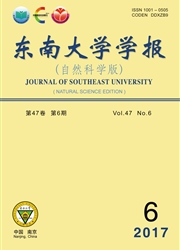

 中文摘要:
中文摘要:
为了解决传统反应式导航中的复杂陷阱问题,优化导航控制,减少计算复杂度,提出了基于自适应模糊神经网络的机器人导航控制及改进型虚目标路径规划方法.首先根据移动机器人运动学模型,融合神经网络的自主学习功能与模糊控制的模糊推理能力,提出了基于自适应模糊神经网络的机器人导航控制器,将生成的Takagi-Sugeno型模糊推理系统作为机器人局部反应控制的参考模型.该自适应模糊神经网络控制器实时输出扰动角度,在线调整移动机器人的预瞄准方向,使移动机器人能够无碰撞趋向目标.然后,提出了一种改进型虚目标方法,优先选择机器人可能逃脱陷阱状态的路径,简化了设计难度,改变了虚目标切换方式,避免了大量复杂计算.实验结果表明,提出的方法可以帮助机器人在全局信息未知的复杂环境中导航,在趋近目标点的过程中能有效避障,无冗余路径产生,且轨迹平滑.
 英文摘要:
英文摘要:
To solve the complex trap problems in the traditional reactive navigation and optimize navigation control with reduction of computational complexity,a navigation method that combines mobile robot navigation control based on adaptive fuzzy neural network and an improved virtual target path planning is proposed.First,a mobile robot controller based on the kinematic model combining the learning ability of neural network and the fuzzy reasoning of fuzzy control is designed,resulting in Takagi-Sugeno fuzzy system which is used as the reference model in local reaction control.The controller outputs disturbance angle for real-time adjustment of the direction of robot,and the mobile robot tends to the target without collision by means of the controller.Then,an improved virtual target method is applied to solve local trap problem.The robot may prefer the path to escape from the trap state.This approach can simplify the design difficulty,change the virtual target switching mode,and reduce a large number of complex calculations.The experimental results show that the proposed method can help the mobile robot navigate in unknown complex environments and approach the target without collisions and redundant paths,and the trajectory is smooth.
 同期刊论文项目
同期刊论文项目
 同项目期刊论文
同项目期刊论文
 期刊信息
期刊信息
